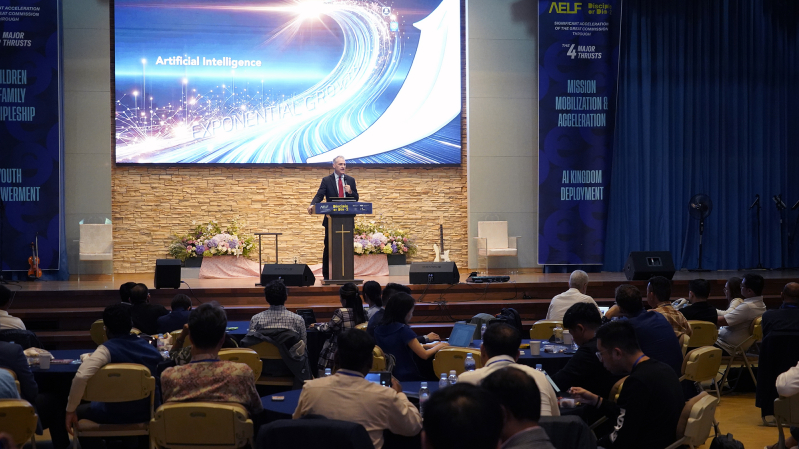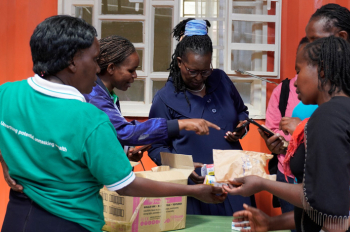
In a sweeping keynote address on the morning of the second day of the Asia Evangelical Leadership Forum (AELF), Mark McClendon, Regional Director for CBN Southeast Asia & South Korea, called on Christian leaders to embrace artificial intelligence (AI) not as a threat but as a God-given opportunity for the global Church to complete the Great Commission.
McClendon’s message, delivered to more than 100 leaders from over 20 countries gathered in Seoul, was part prophetic exhortation, part technological briefing, and part leadership call-to-action. Grounded in John 4:35—“Lift up your eyes and look on the fields, for they are white already to harvest”—he framed AI as a critical tool for evangelism and discipleship in what he described as a unique and historic moment for the Church.
“There has never been a better time,” McClendon said. “Every single one of us is alive right now not by accident, but by divine appointment. We are here to lead in the days of exponential influence.”
McClendon began by distancing himself from his earlier metaphors that portrayed technological change as a tsunami overwhelming the Church. Instead, he declared, “We are not victims. We serve a victorious God who works through His people.”
Rather than cowering in the face of rapid advances in artificial intelligence, he urged leaders to rise like Nehemiah—who, upon seeing the ruined walls of Jerusalem, did not retreat in despair but mapped out a plan, rallied workers, and rebuilt the city.
“Nehemiah didn’t just pray and fast—he took action,” McClendon said. “And so must we. We don’t need to be AI experts, but we do need to be Nehemiahs.”
While McClendon briefly described the technical distinctions between AI, artificial general intelligence (AGI), and superintelligence, he did not dwell on the mechanics. Instead, he focused on how these technologies are rapidly changing every aspect of life—government, education, medicine, and especially communication.
He warned that the Church could not opt out of the AI era. “This is not a trend you can ignore,” he said. “AI will be embedded in every system, every industry. And we are seeing the fastest technological leap in human history.”
Citing examples such as AI-generated images and conversations indistinguishable from human interaction, McClendon explained that artificial empathy and AI’s ability to simulate human connection will revolutionize communication and engagement. “This will deeply impact how people relate to one another—and how they respond to spiritual truth,” he said.
McClendon emphasized that God is not surprised by the sweeping changes brought about by AI, but has always known—and sovereignly directed—the course of history. He drew a parallel between AI-powered satellite communication and the vision in Revelation 14:6, where an angel flies in midair carrying the eternal gospel to every nation, tribe, language, and people.
“I want you to imagine that angel as a winged satellite,” he said. “Right now, there are more than 5,000 satellites above us, and by 2035, there will be more than 20,000—broadcasting internet, data, and the possibility of the gospel into every corner of the world.”
He called these satellites “digital angels” and declared that the Church’s responsibility is not just to marvel at technological innovation, but to appropriate every advancement for God’s purposes.
“For God, there are no surprises,” he said. “From the beginning, He planned for His Church to harness every tool for the proclamation of the gospel.”
According to McClendon, the coming decade—2025 to 2035—will be the era of exponential influence for the global Church, driven in part by the power of AI. Rather than fearing automation, robotics, and synthetic biology, Christian leaders must act with discernment and courage, he said.
He referenced the generational divide that is already forming: “The AI generation is rising. Children and young people are interacting with AI daily. If we, as the Church, do not engage, we will lose this generation’s attention and trust.”
Still, McClendon was clear that wisdom, not panic, is the key. “We’re not talking about replacing pastors or spiritual community,” he said. “We’re talking about using tools that can multiply access to the gospel, simulate care, and engage people in ways we’ve never been able to before.”
He shared a prophetic word from his own father, a professor and media visionary who, in 1972, predicted that “the greatest harvest of souls will be won through mass media.” That prediction, McClendon said, has now evolved: “Mass media is being repowered by AI. The gospel can now move at the speed of light.”
McClendon concluded with a challenge: data and knowledge are useless without action. Referencing a statement made by Dr. Bambang Budijanto, General Secretary of AEA, he said: “Without action, data is meaningless. All of this is only helpful if it leads to action for the Kingdom.”
He closed in prayer, asking God to anoint the leaders present with courage and clarity to build, adapt, and engage—like Nehemiah.
“We see the signs of the times,” he prayed. “We refuse to bow to fear. We are your people, Lord, and we ask you to anoint us to rise up in this season and finish the work of the gospel in our generation.”
The Asia Evangelical Leadership Forum continues through June 13 at Antioch Church in Seoul. The event is focused on the theme “Disciple or Die 2,” and aims to equip evangelical leaders across Asia to engage with urgent spiritual, cultural, and technological challenges facing the Church today.






